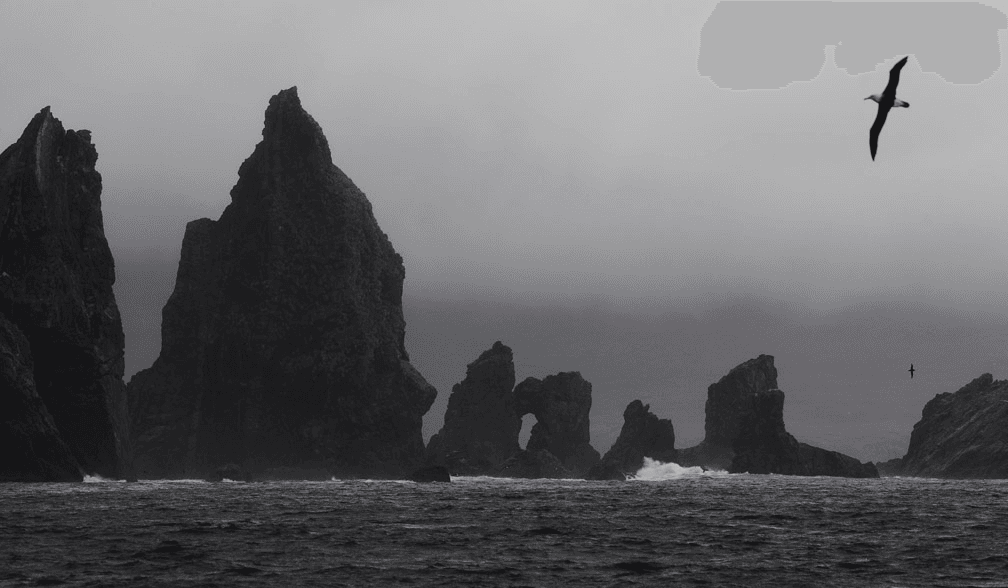A Rockefeller uses his oil legacy to help save the oceans
Chile’s Cape Horn — the southernmost tip of South America. David Rockefeller, Jr. sailed around Cape Horn as part of the Around the Americas expedition. Strong winds, large waves, currents and icebergs make these waters hazardous for sailors.
If 10 percent of the registered vehicles in the US drove just one mile less per day, it would eliminate 22 million tons of CO2 from the atmosphere — which is about the same amount the world’s oceans absorb each day.
That’s according to David Rockefeller Jr., one of the heirs to the Standard Oil company fortune and chair of the Rockefeller Foundation. Over the past decade, Rockefeller has become a strong advocate for saving the world’s oceans.
Many things threaten marine habitat and wildlife, but carbon is clearly the biggest danger, Rockefeller says. When carbon dissolves in the ocean, it increases the acidity of the water. The increased acidity keeps shellfish shells from hardening and interferes with the normal activity of coral reefs. “[This] undermines the ability of the oceans to provide food for the world,” Rockefeller explains. “So I think food is the biggest reason to care about oceans — and the biggest threat is carbon.”
Humans are the principle source of CO2 emissions, Rockefeller explains — through the cars that we drive, the factories that we operate, etc. — so the more we can reduce excess carbon in the global climate system, the better it will be for the oceans of the world.
Rockefeller “grew up on the ocean,” he says, and then became a sailor. To him, the ocean "always looked wonderful." But in 2000, he joined the Pew Oceans Commission and for the next three years “learned about what lurked under the seemingly beautiful surface of the ocean.” After that experience, he became an ocean activist.
“Commissions and reports are just that: they don't themselves transform policy or create action, but they [can] lead to it,” Rockefeller points out. “So, I said to myself, ‘What am I best capable of doing, now that I know the threats to the ocean?’" He says the answer was fairly simple: form an organization that would educate his sailing and boating friends about the problems of the ocean and then activate them into being ocean stewards.
His organization is called Sailors for the Sea. Rockefeller created it based on previous models — such as Surfrider Foundation and Trout Unlimited — in which recreational users of sensitive environments “became passionate advocates of keeping pristine and well-stocked the areas they depended upon for their recreational enjoyment,” he says. “So, who could protect the oceans? Sailors and other boaters.”
So far, he says, the effort is going well. They got the attention of nearly five million sailors and interested boaters when the America's Cup occurred in San Francisco last year. From 2009 to 2010 Rockefeller participated in the Around the Americas expedition to help raise awareness about the condition of the world's oceans.
Rockefeller would also like the foundation to address the problem of overfishing, which, he says, is driven primarily by global population growth. A century ago, the world population was about 2 billion — now it’s 7 billion and projected to grow to 9 billion by mid-century. “[All] those people need protein; they need energy,” Rockefeller says. “As countries like China become wealthier, they will demand more food and more sea protein. So this is a huge challenge.”
The foundation is looking at “what it would take to convince local fishermen to stop fishing for a period of time in order to give the oceans a rest, and what it would take to finance their livelihood between the time they stop and the time they can resume,” Rockefeller says. “It’s very important because, obviously, if you're asking fishermen, most of whom are not wealthy people, to give up their livelihood, you need to help them deal with that. That's the zone we are looking at.”
Unlike his “sibling foundation,” the Rockefeller Brothers Fund, the Rockefeller Foundation does not plan to divest completely in fossil fuels. Its investments in coal, oil and gas are already less than 1 percent of their total, he says.
“We're already at a low level and we will probably continue to look at it,” he says, “but we won't go to the divestment route — but I'm very proud of the Rockefeller Brothers Fund for speaking out publicly about this issue.”
This story is based on an interview that aired on PRI's Living on Earth with Steve Curwood.
